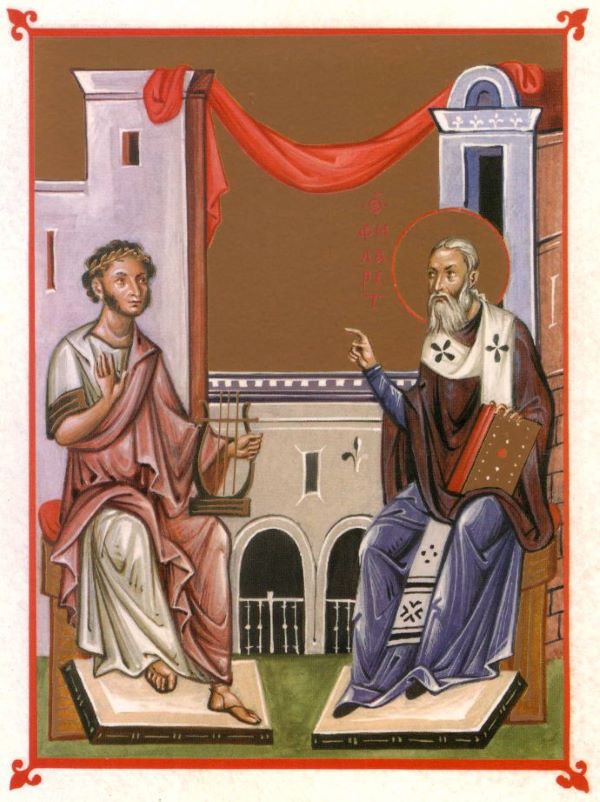This is a poetic conversation between Pushkin and Philaret, Metropolitan of Moscow and Kolomna. The first poem is dated May 26, 1828 (O.S.), Pushkin’s twenty-ninth birthday.
Gift of chance, O gift so senseless,
why, life, were you given me?
Why is death the final sentence
of a hidden destiny?
Who, imbued with power and malice,
from oblivion drew me out,
filled my soul with passion’s madness,
then disturbed my mind with doubt?
Burdened with a heart that’s barren,
mind without a use or aim,
I find wearisome, past bearing,
life’s monotonous refrain.
Edits
S2L1: What uncanny force, in malice, > Who, imbued with power and malice,
S3L3: weary, beyond bearing, > wearisome, past bearing,
Crib
Vain/purposeless gift, chance gift,
life, why [were] you given to me?
Or why by a secret destiny
[were] you condemned to execution?
Who, with malevolent power,
from nothingness/insignificance summoned [me],
filled my soul with passion,
agitated [my] mind with doubt?
There’s no goal before me:
[my] heart is empty, mind is idle,
and life’s monotonous noise
wearies me with melancholy.
Original
Дар напрасный, дар случайный,
Жизнь, зачем ты мне дана?
Иль зачем судьбою тайной
Ты на казнь осуждена?
Кто меня враждебной властью
Из ничтожества воззвал,
Душу мне наполнил страстью,
Ум сомненьем взволновал?..
Цели нет передо мною:
Сердце пусто, празден ум,
И томит меня тоскою
Однозвучный жизни шум.
Emory professor Oleg Proskurin argues that the usual identification of the malicious force with God would have been a dangerous blasphemy and that Pushkin must have meant, and his contemporaries understood, a demonic force.
In early January 1830, Philaret was acquainted with Pushkin’s elegy by Elizaveta Khitrovo, the daughter of Field Marshal Kutuzov. Within a few weeks, she showed Pushkin a poem of the same length and meter in which Philaret, using many of Pushkin’s own words, had turned his elegy into a spiritual ode. There are several versions, of which this is the most popular:
Not a simple chance, not senseless,
is the life God gave to man;
life receives its deadly sentence
not without a hidden plan.
It was I, from murky chasms,
summoned evil in my pride,
I who filled my soul with passions
and with doubt disturbed my mind.
Pierce the dusk, and be remembered
in forgetfulness; abide
in my thoughts until I’m rendered
pure of heart, serene of mind!
Edits
S2L4: who > and
Crib
Not in vain, not by chance
life from God to me [was] given,
not without God’s secret will
[was it] also to execution condemned.
I myself, with willful power,
summoned evil from dark abysses,
myself filled [my] soul with passion,
agitated [my] mind with doubt.
Be remembered to me, [you who’ve been] forgotten by me!
Shine forth through the dusk/gloom of thoughts,
and [be] made by You
a pure heart, a bright/serene mind!
Original
Не напрасно, не случайно
Жизнь от Бога мне дана;
Не без воли Бога тайной
И на казнь осуждена.
Сам я своенравной властью
Зло из темных бездн воззвал;
Сам наполнил душу страстью,
Ум сомненьем взволновал.
Вспомнись мне, забытый мною!
Просияй сквозь сумрак дум,
И созиждется Тобою
Сердце чисто, светел ум.
Pushkin’s reply was dated January 19, 1830 (O.S.). Many scholars believe that he was deeply moved, while some detect a subtle irony. Oleg Proskurin argues that the language is too elevated even for a church hierarch and could have been addressed only to God, with the seraph standing in for Philaret. (A friend of Pushkin’s related that Philaret’s name appeared in the original text, but was replaced with “seraph” before the poem appeared in print.)
In hours of merriment and leisure,
I oft confided to my lyre
indulgent notes of idle pleasure,
of madness, passions and desire.
And yet, despite myself, I halted
and stilled the lying strings I strummed
when suddenly your voice, exalted,
came over me and left me stunned.
I wept unlooked-for tears in torrents,
and, for the wounds my conscience feels,
your fragrant words would come as sources
of purest oil that soothes and heals.
And from a sacred height above me,
you now extend your hand to guide
my steps with power meek and loving
and tame the dreams that ran so wild.
My soul, now singed, abhors the darkness
of vanities; it feels your flames,
discerns the seraph’s harp and harkens
in holy terror to the strains.
Edits
S1L2: commended > confided
S2L3: voice exalted > voice, exalted,
S3L3: speeches > words would
S5L2: vanity > vanities
Crib
In hours of amusements or idle boredom,
to my lyre I would entrust
delicate/pampered sounds
of folly, laziness and passions.
But even then I would interrupt,
despite myself, the hum of a false/wicked string
when your majestic voice
suddenly stunned me.
I would shed streams of unexpected tears,
and for my conscience’s wounds
the pure oil of your fragrant discourses
was comforting.
And now, from a spiritual height,
you extend your hand to me
and, with meek and loving strength,
subdue [my] turbulent dreams.
My soul, singed by your fire,
has rejected the darkness of worldly vanities,
and the poet harkens to the seraph’s harp
in holy terror.
Original
В часы забав иль праздной скуки,
Бывало, лире я моей
Вверял изнеженные звуки
Безумства, лени и страстей.
Но и тогда струны лукавой
Невольно звон я прерывал,
Когда твой голос величавый
Меня внезапно поражал.
Я лил потоки слез нежданных,
И ранам совести моей
Твоих речей благоуханных
Отраден чистый был елей.
И ныне с высоты духовной
Мне руку простираешь ты,
И силой кроткой и любовной
Смиряешь буйные мечты.
Твоим огнем душа палима
Отвергла мрак земных сует,
И внемлет арфе серафима
В священном ужасе поэт.

Archimandrite Zinon (Theodor),
Pushkin and Metropolitan Philaret (from an icon painted after Philaret was canonized in 1994)

